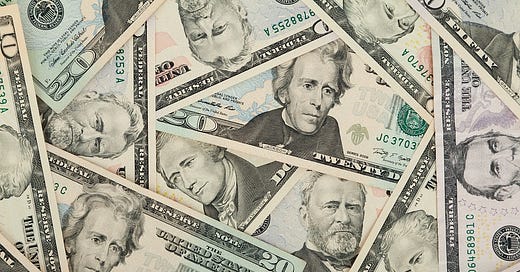I like Christmas. But the thing I don’t like about the holiday season is the consumer mentality — and focus on buying things, even one times buying junk just for the sake of giving or partaking in the spirit of the holiday.
Depending who you are and who you have to/choose to buy for, the holiday season likely sets you back $1,000 to $2,000 at the very least which can be a problem for some folks with irresponsible spending habits and poor financial literacy.
It’s been a wild year for retail investors and people everywhere. Some lost their small businesses to Covid, others received record pay and bonuses. Some lost all their money in crypto and reckless stock gambles, and others received money from the government but have long since wasted it on luxuries or vices.
The public’s relationship with money and class has been highlighted amid the market’s large pullback, ponzi/scam blowups, political corruption in re: to trading on insider info, and other prolific finance themed stories (FTX, Wells Fargo Corruption, etc.)
More Americans, in the face off stifling inflation, massive lump sums sent to Ukraine, a growing wealth gap, and questionable Federal Reserve policies are re-examining where they stand in society and what their relationship with wealth and money actually is.
It’s no secret that there is a large contingency of people effectively living off of the US government and taxpayers and there are large groups of people that heavily utilize forms of bad debt like credit card, BNPL plans, cars, homes they can’t afford etc…..
People’s financial health at this moment in the US is likely varied. But one things for sure — many are in a poor position and will suffer from the likely full blown recession we are moving into.
Have you ever wondered how you stack up against others when it comes to net worth?
As the new year approaches many are going to reexamine subscriptions, purchases, and things they’re spending on to see where they can adjust, cut back, or afford without.
In a recent survey by NY Sports Day, 51% of Americans said they're living paycheck to paycheck with no savings to fall back on.
Dark.
This is pretty appalling considering it’s possible we see an escalated recessionary period and more severe instances of supply shortages, bumps in energy prices, and cost of living across the board. Many are one job loss away from bankruptcy and ruin.
We’ve had a lot of followers and subscribers ask us to do a comprehensive overview of net worth, bettering your net worth, and the ways to think about it at each age level.
Net worth is likely going to be something people care about a lot in the coming months and year because we are witnessing a sailing of the ship so speak in terms of who in the lower, middle, and upper middle classes still has a chance to acquire enough assets and wealth to make it.
The clock is ticking faster than ever guys and the race is on to stash away the most wealth as you physically can before things get worse.
We also get bombarded by others on requests to do a benchmark post for net worth given the highly competitive bunch that follow us so thought this would be a good way to lay out the broad strokes for everyone to see and debate on.
People often ask us via DM or wonder in their free time:
Is my net worth good?
Is it good for my age?
How do I compare to others/my peers
Am I on track to be wealthy/have a solid net worth
Am I falling behind and not realizing it?
Net worth is an important function of any individual’s financial health and therefore most would benefit from knowing where they stand amongst peers and how they are progressing towards larger financial goals like complete self sufficiency.
Additionally according to the Census Bureau wealth is an important indicator of economic well-being that provides valuable insights into a household’s economic health.
For example, during financial hardships, such as unemployment, illness, or divorce, wealth is a source of liquidity to pay expenses and bills. We expect this facet to be of particular importance in the next two years for many people.
If you don’t know where you stand you’re behind the ball already because you don’t have any benchmark to compare yourself too and you lack the ability to critically look at your progress or lack thereof so far. Don;t be that bum that gets to age 30 with $5,000 and $50,000 in credit card debt, and no assets/side incomes wondering where all the good years went.
That’s the epitome of down bad.
We did our best to synthesize and compile the best resources online for assessing where you stand in regards to your net worth and age. We have book recommendations, online resources, and general tools we’ve used to learn more and more about wealth accumulation easily.
Ahead of 2023 this will be our comprehensive post on net worth, saving dynamics, and savings rates of Americans and young people.
Let’s first start with what might constitute a ”good net worth” for your age bracket to see how you stack up against other people and to see if you are on the right track to having a top % net worth or if you you’ll end up eating the bugs and living inside a climate controlled Beyond Meat social security pod with a measly monthly CBDC allowance that you can’t spend on anything but Lizzo live concerts, Bang Energy drinks, and Ukraine care packages.





